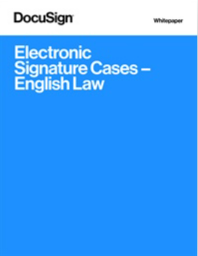Electronic Signature Cases – English Law
The case law on electronic signatures is best understood with an appreciation of the legal function of signatures. Usually, when we sign documents, there is no actual legal requirement to use a signature.
We sign voluntarily, to show that we associate ourselves with the contents of the document – be it a letter, a contract, an acknowledgment of receipt or some other kind of legally significant document. For a contract, the act of signing also shows that we intend to conclude the contract and be bound by its terms.
Download now to find out more!
Read More
By submitting this form you agree to DocuSign contacting you with marketing-related emails or by telephone. You may unsubscribe at any time. DocuSign web sites and communications are subject to their Privacy Notice.
By requesting this resource you agree to our terms of use. All data is protected by our Privacy Notice. If you have any further questions please email dataprotection@techpublishhub.com


More resources from DocuSign

Guide to Electronic Signatures
As work evolves to take place outside the four walls of the traditional office, small and midsize organizations need to adapt to stay competitive. ...

How to Choose an E-Signature Solution
The benefits of e-signature technology are far reaching. Today, e-signature technology is used around the globe in nearly every industry and depart...

The Total Economic Impact™ of DocuSign CLM
DocuSign provides a contract lifecycle management (CLM) solution that acts as a centralised, cloudbased repository for customers' external and inte...